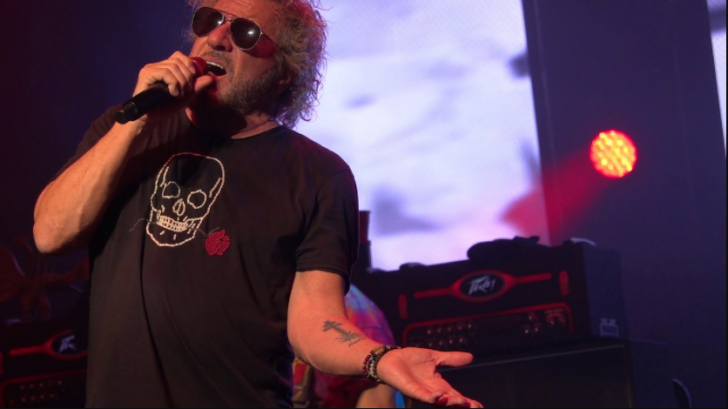Sammy Hagar thought history was recurring when he received a 2 AM phone call from Eddie Van Halen in November 1995.
Van Halen’s jittery Balance Tour was nearing the end in Japan, as was the frontman’s tenure with the group. Although the exact separation did not take the point that night, the fact that he mentioned Hagar of how he had been expelled from Montrose almost unquestionably accelerated the painful end.
In his 2012 memoir Red: My Uncensored Life in Rock, Hagar described the event, which took place at a period where the members of Van Halen were traveling independently and visiting different hotels. “About two o’clock in the morning, Eddie called,” the singer wrote. “He had wiped out his minibar. Wasted on his ass. … ‘What are you going to do when we get back?’ he said. … ‘I don’t know,’ I said. ‘Take some time off. What are you going to do?’ ‘I don’t know yet,’ he said. ‘When I figure it out, I’ll let you know. I’ve got some plans, but I’ll let you know if it involves you or not.’ ‘Okay,’ I said. ‘Fuck you.’ I hung up the phone.”
Hagar explained the discussion as “the Ronnie Montrose story all over again.” He had earlier recounted a discussion in the Montrose tour bus precisely 20 years earlier: “Ronnie turned around to talk to me. ‘After tonight, I’m quitting the band. What are you going to do?’ He said. … ‘I’m going to start another fucking band. What the fuck do you think I’m going to do?’ He reached back and shook my hand. ‘Okay, good luck,’ he said. He didn’t even look at me onstage. … It was a horrible ending.”
Hagar’s past with Van Halen wasn’t truly done after the phone call. He and his wife had decided to buy a home in Hawaii, as a preparation for the birth of their daughter. “As soon as the tour ended, the [Van Halen] brothers started calling every day,” he said. “We just did a record and a world tour, and these crazy bastards wanted to go in and do a song for the movie Twister. I was not down with it. All they wanted was to get me off the island. [Manager] Ray Danniels would be on the phone saying things like, ‘If you’re not back tomorrow, we’re assuming that you’ve quit the band.’”
Finally, Hagar chose to take part in the plan but discovered himself at odds with the Van Halens’ artistic path. After being told he’s not allowed to go home after the sessions because he had to work on another song, he refused. “I went back to my hotel room and changed my name at the front desk,” he said. “Eddie was trying to call me at night. Security knocked on my door to tell me they had Eddie Van Halen on the phone. … ‘What do you want us to do?’ the guy asked. ‘Tell him to go fuck himself,’ I said. That’s when they called [David Lee] Roth.”
He later took another call from Van Halen. “‘You’ve never been a team player,’ he said. … ‘You always wanted to be a solo artist. You can go back to being a solo artist. We’ve been working with Roth on the greatest-hits record and it’s going great.’ They’d been working with him behind my back while I was in the hospital with my wife having a baby.” A follow-up call from Danniels, who wanted to calm the situation, did no good. “‘Go fuck yourself, for starters,’ I said. ‘Second of all, congratulations. You just broke up the biggest band in the world. … Fuck you. It’s over.’”
“Eddie always said I quit, and maybe I did,” Hagar reflected.
“It got so bad that I actually started drinking again,” Eddie said of the strains with Hagar the next year. “He stopped being a team player. He was especially irritated by the fact that I began to get involved with the lyric writing. … Whenever I suggested something to Sammy, he would just stop talking to me.” He said their final phone conversation resulted in Hagar saying, “I want to go back to being a solo artist” and that he replied, “Thank you for being honest. … I didn’t fire him. He just quit.”
Although he performed on Best of – Volume I, Roth was not part of the band full time; Gary Cherone ultimately took over as the frontman. Hagar reunited with the band in 2003 but was replaced by Roth four years later. Hagar and Eddie Van Halen eventually resolved their disputes in the periods leading up to the guitarist’s death in 2020. “It seems like, hey, we had a great thing,” the singer noted. “This music will live forever, beyond me.”

